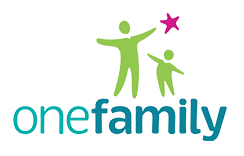Press Release
A July of Fear and Insecurity for over 9,000 Lone Parents
One Family will state at the pre-budget forum that Department of Social Protection has put lone parent families in the frontline of austerity and the back of the queue for the recover.
www.onefamily.ie
(Dublin, Thursday 3 July 2014) One Family – Ireland’s organisation for one-parent families – is participating in Department of Social Protection’s pre-budget forum tomorrow, where One Family’s Stuart Duffin and a lone parent member of One Family’s Budget Panel will call for joined up thinking and security. The whole of Government must enable lone parents to create better futures rather than implementing further complicated systems that result in continued entrapment in poverty for families already on the edge, such as those being implemented today with changes to the One-Parent Family Payment.
“If you looked at me you’d never think I have only €16 to my name. I wear a suit to work in a very well-known company, my son is in a good crèche, I live in a 3 bedroom house (because it’s €100k in negative equity so I can’t afford to sell it). And here I am, without money for food.”
– Lone parent quoted in One Family’s Pre-Budget Submission 2015
58% of lone parents in Ireland are working, often in low paid part-time employment. Some working lone parents now face a barbaric income reduction of up to €200 per month. The changes – first announced in Budget 2012 – are causing great confusion and stress to lone parents. These men and women are not asking for hand-outs but to be supported as they strive towards bettering their children’s futures. The Department of Social Protection has put one-parent families in the frontline of austerity and the back of the queue for recovery due to the lack of development of joined up policies and supports. These cuts without supports such as out of school care, access to part-time education and less earned income have resulted in what feels like a sustained attack on one-parent families.
Karen Kiernan, One Family CEO, comments: “Food banks symbolise the insecurity facing so many. More needs to be done to understand and tackle the reasons why families have to access free food to live. We need a new approach that prioritises secure futures for one-parent families and that will reduce child poverty. Lone parents want and are keen to work yet the short-sighted nature of social welfare measurements firmly put one-parent families in deeper and deeper pits of poverty.”
The Pre-Budget Forum on Friday will be hosted by Minister Joan Burton. Its purpose is to provide organisations including One Family to input into the Budget process and to discuss their Pre-Budget Submissions with the Minister and senior officials of the Department.
Stuart Duffin, One Family Director of Policy and Programmes, comments: “On Friday we will highlight that this is a chance to move on from attacking the victims of poverty to addressing its causes – such as the lack of decently paid jobs, expensive housing and unaffordable childcare that have left many lone parents doing too much of the heavy lifting out of poverty. The ridiculous reduction in the Income Disregard combined with the mediaeval threshold nature of FIS and its annual review disincentive the ability to work. One-parent families are consistently those most at risk of or living in poverty in Ireland. Now is the time for some real vision and ambition in tackling the root causes of family poverty by investing in lone parents and making work pay. We will also voice our 10 Solutions – ten practical solutions that Government could implement at no or low-cost yet which would result in real progression for one-parent families – which form the basis of our Pre-Budget Submission.”
Simple actions will deliver investment in one-parent families:
- Reform the Income Disregard into a Tax credit paid into the pay packet,
- Deliver free part-time education,
- Invest in the economic benefits of Out of School Childcare and Recreations (OSCAR).
One Family is hearing from lone parents to its askonefamily helpline and through our monthly surveys and Facebook page that these changes will make it almost impossible for many of those who are already working to sustain their employment. The reality is that these changes could mean an increase of over 55,000 more people onto the live register over the next 3 years as lone parents are transitioned to Job Seekers Allowance without adequate Government supports such as the long-promised affordable, local, quality childcare. Recipients of the OFP are excluded from schemes like Jobs Plus so there is, in effect, also a disincentive in place for employers to employ them.
One Family’s Pre-Budget Submission can be read here: https://www.onefamily.ie/wp-content/uploads/One-Family-2015-Pre-Budget-Submission_June-2014.pdf
More information about One Family’s 10 Solutions can be read here: https://www.onefamily.ie/policy-campaigns/one-family-campaigns/ten-solutions-for-smarter-futures/
Parents affected by the changes can contact askonefamily lo-call helpline for advice and support on 1890 66 22 12 or by emailing support@onefamily.ie
/Ends.
About One Family
One Family was founded in 1972 and is Ireland’s leading organisation for one-parent families offering support, information and services to all members of all one-parent families, to those experiencing an unplanned pregnancy and to those working with one-parent families. Children are at the centre of One Family’s work and the organisation helps all the adults in their lives, including mums, dads, grandparents, step-parents, new partners and other siblings, offering a holistic model of specialist family support services. These services include the lo-call askonefamily national helpline on 1890 622 212, counselling, and provision of training courses for parents and for professionals. One Family also promotes Family Day and presents the Family Day Festival every May, an annual celebration of the diversity of families in Ireland today (www.familyday.ie). For further information, visit www.onefamily.ie.
Available for Interview
Karen Kiernan, CEO | t: 01 662 9212 or 086 850 9191
Stuart Duffin, Director of Policy & Programmes | t: 01 662 9212 or 087 062 2023
Further Information/Scheduling
Shirley Chance, Director of Communications | t: 01 662 9212 or 087 414 8511






